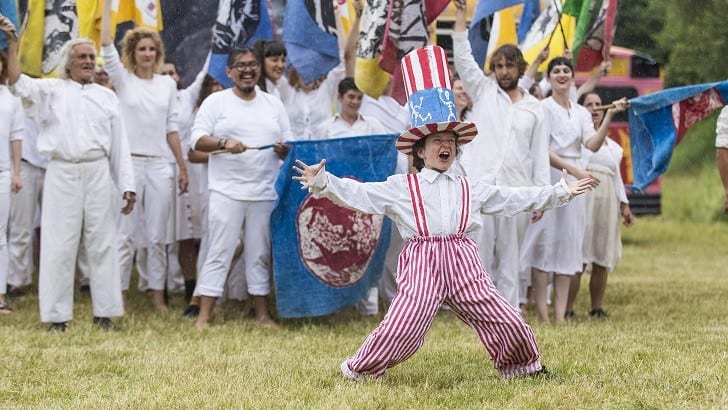
There are puppet shows. There are circuses. And then there’s Bread and Puppet’s Our Domestic Insurrection Circus, which is not likely to be so recognizable to those who are familiar with traditional forms of either of the aforementioned spectacles. For this circus addresses “the absurdities of our current political moment,” comes complete with “a contingent of archetypal washer women in the guise of the National Demolition and Composting Force,” and features “a giant blue pageant puppet representing water protectors, and decapitalization decapitations of capitalist monsters, frequently interrupted by unignorable sunrises.”
And it’s interactive. As promised, “Bread and Puppet accompanies their proposal of general insurrection with the announcement of a new political party, the Possibilitarians, who have a platform that includes promoting the ‘thousand alternatives’ to the capitalist empire system… Possibilitarian candidates are nominated and audience members are invited to sign up to volunteer to construct this new political party.”
For more on the myriad political and entertainment possibilities headed to Cambridge on Sunday, we reached out to puppeteer Joshua Krugman to bring readers up to speed on everything from Bread and Puppet’s burlap bison to their Massachusetts Labor Day tradition.

This is an annual occurrence in Cambridge at this point. What is the Bread and Puppet connection with the crowd here like, and how much does the show typically change from year to year?
We love to perform for the diverse, socially and politically engaged crowd in Cambridge. We’re honored to be so warmly welcomed back year after year. It’s great to perform on the Cambridge Common in the middle of everything because we also get a lot of unsuspecting audience members, passersby who get turned into a public by the paper maché clouds, the stiltwalkers, the flagrunners, and brass band.
There are common elements year to year, and they are always remade to respond to the current moment. For example, the washerwoman is a classic Bread and Puppet character that represents the strength of working class women. Washerwomen fight and triumph over all kinds of evil. What that evil is and how it is to be conquered changes with the times. This year the washer women fight a series of billionaires—tall paper maché reliefs—who appear in the guise of “The Joint Chiefs of Disaster,” “Energy Transfer Partners” (the corporate entity behind the Dakota Access Pipeline), and “The US-Mandated Fiscal Control Board” (which is imposing austerity on Puerto Rico to the benefit of US hedge funds).
Please tell us a little more about “Our Domestic Insurrection Circus,” and why it is especially fitting for this point in history.
Domestic insurrection is called for when a government becomes largely a club of millionaires and billionaires pursuing the interests of that club, rather than the those of the majority. Domestic insurrection is called for when our neighbors are rounded up and sent back to countries where they fled war, persecution, or poverty. Domestic insurrection is called for when foreign policy seeks to prolong and exacerbate international conflicts in order to maintain high sales of US weaponry. Domestic insurrection is called for when money collected from taxpayers is used to develop new world-ending weapons instead of keeping public schools open and providing healthcare to all. Domestic insurrection is called for when the organs of public information are controlled by the same billionaires that have hijacked the government. Domestic insurrection is called for when police occupy poor, black and brown neighborhoods, using excessive force with impunity, and when one of every eight African American men in the country is unable to vote because of a past conviction. Domestic insurrection is the urgent response of citizens and residents to the catastrophe of our current economy and politics.
The Domestic Insurrection Circus calls for the disposal of the incompetent ruling class by underthrowing them from the toes up and immediately implementing the 1,000 alternatives to the wasteful and destructive habits of Capitalism.
The Domestic Insurrection Circus proposes a new political party, the Possibilitarians, as a potential instrument for this implementation. The Possibilitarian Pro-Paradise platform says that “total consumer non-confidence must be the cornerstone of a new, non-profitable economy,” and that “the sky must be restored to its advisory capacity for all aspects of humdrum life.”

Who are some of the new characters we are going to meet when Bread and Puppet comes to town this time?
We’ll meet Puerto Rican students fighting US-imposed austerity, Washerwomen who compost the war machine, Hedda Gobler who possesses the rare ability to train wild turkeys, Shwa people from the Ecuadorian Amazon who are fighting oil companies, belligerent Kaspers, contradancing goats, and Pinky the Elephant.
On a technical note, how do you actually transport these magnificent puppets to a show like this?
We travel in a converted school bus painted by founder and director Peter Schumann. The bus will also form the backdrop for the show.
Bread and Puppet started in New York City more than 50 years ago, but has been up in the sticks in Vermont since the 1970s. When you bring performances to places like Cambridge, for us city folk, do you tend to notice how tightly wound we are? And how might the experience loosen up some city slickers in the crowd?
I think the show is meant to shake city slickers and country cornstalks alike out of their complacency in the face of the destruction of the planet and the political and economic tyranny under which we all live, and inspire them with the Possibilitarian battlecry that there are 1000 alternatives to this system, that we have the power to do away with this system. That’s why the washer women knock over the billionaires so much in this show. We’re showing you it can be done.

What is New England’s history with alternative puppet theater? Would you say we’re in the epicenter? I know we have the Puppet Free Library on Newbury Street, which has some ties to Bread and Puppet.
The Boston area has several long-running radical puppetry projects including the Puppeteers’ Cooperative, founded by Bread and Puppeteer Sara Peattie, and the HONK! Festival, founded by Bread and Puppeteers John Bell and Trudi Cohen.
Finally, can you please explain the post-show sourdough rye bread ritual to the uninitiated…
For Bread and Puppet, art (represented by puppetshows) and food (represented by bread) are both essential to human life, and should be freely available to all people in sufficient quantity and variety. Pairing the bread with the puppetshow makes this point. Also we find that the puppetshows and the bread both need good chewing in order to get at the sense of them.
BREAD AND PUPPET’S ‘OUR DOMESTIC INSURRECTION CIRCUS.’ SUN 9.3. 3PM/FREE/ALL AGES. CAMBRIDGE COMMON, CAMBRIDGE. BREADANDPUPPET.ORG
Dig Staff means this article was a collaborative effort. Teamwork, as we like to call it.

